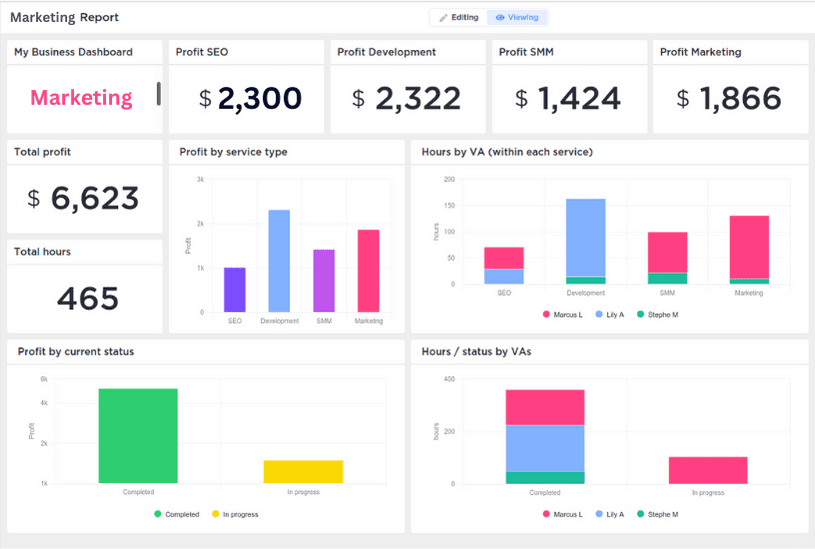Business Analytics
- Home
- Case Studies
- automation
- Business Analytics






- Published :June 16, 2023
- Client :Confidential
- Category :business, Business Development
- Share :
Leveraging Business Analytics for Marketing and E-commerce Businesses
Introduction In today’s competitive business landscape, marketing and e-commerce businesses need to harness the power of data analytics to drive growth and make informed decisions. This case study explores how integrating and automating processes using ClickUp, Monday.com, Make, and Zapier can optimize operations and maximize productivity.
Business Challenges ABC Marketing, a growing e-commerce company, faced several challenges in managing their marketing campaigns and e-commerce operations efficiently. These challenges included:
a. Disconnected Tools: ABC Marketing used different platforms to manage tasks, projects, and campaigns, leading to fragmented workflows and difficulty in tracking progress. b. Manual Data Entry: Employees spent excessive time manually entering data from one system to another, leading to data errors and inefficiency. c. Lack of Automation: Important tasks, such as sending follow-up emails or updating inventory levels, were performed manually, leading to delays and potential errors. d. Inconsistent Communication: Lack of a centralized platform led to miscommunication, missed deadlines, and overall confusion within the teams.


Solution Overview To address these challenges, ABC Marketing implemented a holistic solution combining ClickUp, Monday.com, Make, and Zapier. ClickUp and Monday.com were chosen as project management tools, while Make and Zapier were selected for integration and automation.
Implementing ClickUp and Monday.com a. ClickUp: ABC Marketing migrated all their task management, project tracking, and document sharing to ClickUp. The platform’s customizable features allowed teams to create unique workflows, prioritize tasks, and collaborate efficiently. b. Monday.com: ABC Marketing utilized Monday.com for sales pipeline management, tracking leads, and analyzing conversion rates. The platform’s visual interface and automation capabilities provided a real-time overview of the sales process, improving decision-making.
Integration and Automation with Make and Zapier a. Make: ABC Marketing leveraged Make, an integration platform, to connect ClickUp, Monday.com, and other third-party applications. Make allowed seamless data transfer between different platforms, reducing the need for manual data entry and ensuring data accuracy. b. Zapier: Zapier was used to automate repetitive tasks and create custom workflows. For example, when a new lead was added in Monday.com, Zapier triggered an automated email sequence in ClickUp, ensuring timely follow-up. This integration eliminated manual intervention and improved customer engagement.


Results and Benefits
a. Streamlined Workflows: By centralizing project management, ABC Marketing experienced improved team collaboration and communication. Tasks and projects were easily tracked, and progress was visible to all stakeholders. b. Time and Cost Savings: Automation reduced the time spent on repetitive tasks, allowing employees to focus on more critical activities. The reduction in manual data entry also minimized the chances of errors. c. Enhanced Decision-Making: Real-time data and analytics provided by ClickUp and Monday.com allowed ABC Marketing to make data-driven decisions promptly. The sales pipeline visibility enabled proactive measures to optimize conversions. d. Improved Customer Experience: Automation of customer interactions, such as timely emails and inventory updates, ensured a smooth and personalized experience for customers. This led to increased customer satisfaction and retention. Conclusion By implementing ClickUp, Monday.com, Make, and Zapier, ABC Marketing successfully transformed their marketing and e-commerce operations. The integration and automation of processes streamlined workflows, improved efficiency, and enhanced decision-making. This case study highlights the significant benefits of leveraging business analytics tools and platforms to drive growth and competitiveness in the modern digital landscape.

